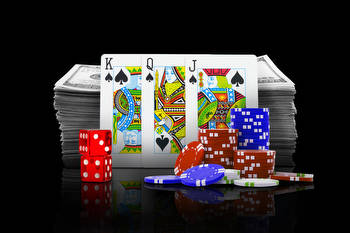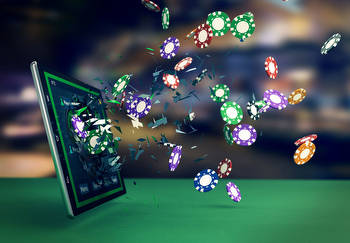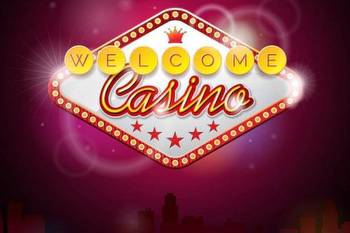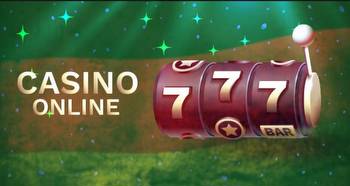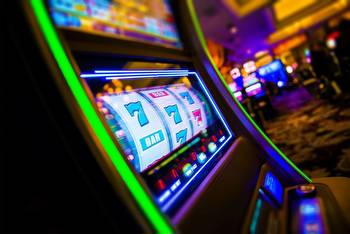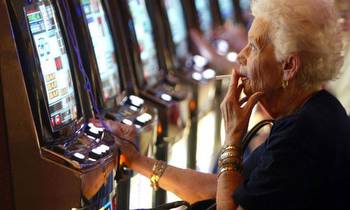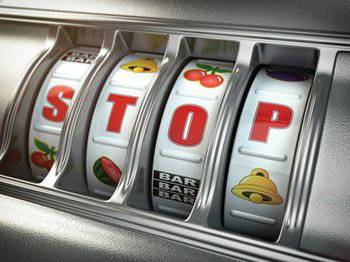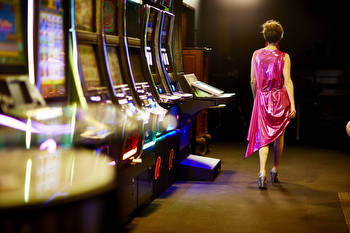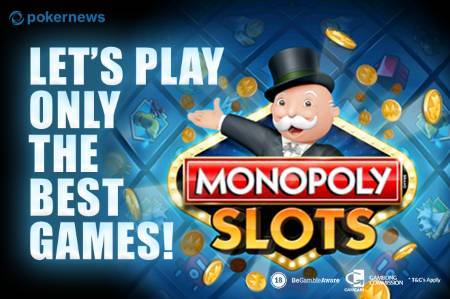Is Online Gambling Bad for You? Let's Dive Into the Science.

“It’s euphoric. It’s a rush. You’re letting go to something you don’t have control over, even if you sometimes want to believe that you do,” says Brian Christopher. “And while it’s obviously better when you win, you get that buzz anyway. I do this for work and I still get a thrill out of it. I can bet just $5 or $500 on a spin, and get a thrill from both — though my heart is definitely racing on the big one.”
Christopher thinks about gambling a lot, not least because he gambles a lot. As more and more interest in gambling moves online, he’s become the leading casino gaming influencer — he gets many millions of views live-streaming himself playing slots on YouTube, and often losing. He lost $300,000 in one year; though, of course, his business model (if not his gambling) brings him out on top. “I know how gambling works and even I’ve been guilty of chasing losses,” he says. “But you can always pick another loser.”
In that, of course, he is not alone: Thanks to a combination of the anxiety-inducing pandemic lockdowns and gambling’s arrival on mobile devices, more of us are gambling than ever.
The psychology and biology of betting is complex. When gambling gets pathological — that’s to say, when it’s recognized as extreme and beyond one’s control — neurobiological processes are altered, though it’s unclear whether those processes are a response to gambling, or whether they existed before in someone predisposed to it.
As Dr. Marc Potenza, a specialist in addiction psychiatry at the Yale School of Medicine, points out, we have all evolved “to make decisions regarding risk and reward, and to engage in those processes…[like] finding food, for example, and going back to those places where we found food.” He calls this engagement an “advantageous trait.” In some sense, we’re all born gamblers. It’s vital to our survival as a species.
Many of us may happily gamble too, albeit on forms of gambling — the stock market, for example — that don’t carry the same stigma of betting at the slots or on sports.
For others it’s much messier. A small minority, only an estimated 1 to 2% of the general population, develops what has come to be called “gambling disorder.” This is often catastrophic to their health, not to mention relationships, social life, employment and, of course, finances. If you’re a pathological gambler, you’re more likely to sleep much less than average. You probably smoke, drink and binge eat more, too. It’s small wonder then that chronic stress levels can get stratospheric; in a 1980s study of the 398 people who died inside Atlantic City casinos over a four-year period, 330 of them were sudden cardiac arrests. Almost a quarter of pathological gamblers will attempt suicide at some time in their lives.
Your Brain on Betting
It’s grim reading. But that’s not you, of course. You’re in control of your gambling, right? And that may well be true. But while you may not be one of the estimated two million gambling addicts in the U.S., perhaps you’re one of the 20 million with a habit that seriously interferes with some aspect of your life. Or maybe your occasional gambling is little more than harmless fun.
“As with any any other behavioral disorder, the behavior is a blend of biological predisposition mixed with cultural, social and environmental factors,” says Dr. Timothy Fong, clinical professor of psychiatry and co-director of the UCLA Gambling Studies Program. “I have gambling disorder patients tell me they feel sweaty and alive [when they gamble]. They talk of feeling sucked in, of there being a scratch they have to itch. Yet other people feel absolutely nothing, and it’s just as interesting to ask why some people are so averse to it.”
“I’ve gambled thousands of times and sometimes I’ve found it exciting and other times boring,” he says. “Gambling just isn’t the same experience for everyone. But the problem is the same — not being able to pull away from it.”
When you place a bet, parts of the brain go into overdrive and other parts are under-active (whether you have a disorder or not). Potenza’s neuroimaging studies have revealed that brain regions involved in pathological gambling are similar to those involved in drug or alcohol addictions. Be it a sniff or a spin of the wheel, the prefrontal cortex — the seat of rational choices, where decisions are made about whether, say, to choose a small but immediate reward or a later, larger one — takes a hit.
This is why, a decade ago, the bible of psychiatric diagnosis in the U.S., a manual called the Diagnostic and Statistical Manual of Mental Illnesses, categorized gambling addiction with other substance-related, addictive disorders. (Instead of an impulse control disorder, like kleptomania.) Shared features include the withdrawal, the failed attempts to quit, the cravings, the highs. There are also indications that the rush of gambling likewise diminishes over time, with an actual corresponding drop in electrical activity in the reward centers of the brain.
Online Gambling Makes It Too Easy
How do problem gamblers compensate? They chase the buzz they’ve grown used to, by placing ever-larger bets, or trying other forms of betting until they’ve tried them all. In the online gambling era, of course, it’s easier than ever to complete that quest.
Neurochemical studies have suggested that gambling causes a spike in the brain’s reward system, promoting the release of chemical messengers dopamine and serotonin. These are associated with feelings of pleasure, satisfaction and happiness, and also risk-taking. Some studies suggest that gambling addicts even get a bigger kick out of this dopamine than non-addicts. As Fong notes, most people enjoy the release of dopamine, unconsciously anyway, but don’t pursue the behavior that causes that release over and over — any more than the casual drinker needs to keep drinking until he can’t stand.
However, both groups — the casual and addicted gambler — are subject to the same twists of human psychology. Consider “intermittent reinforcement,” the hard-to-break sense that every loss just takes you one more step towards the win. Being able to gamble alone, without judgmental onlookers, rapidly encourages addictive gambling. (Even before the mobile era, that’s why the frequency of bets placed on slot machines was always more enticing than the long-range play of a lottery transaction.) Then there’s the “loss disguised as a win” concept, or a small win that’s lower than the stake; and the “near miss” effect: two matches and nearly but not quite three on the slots, for example.
“That subjectively is a loss,” explains Dr. Stephen Sharman. “But it feels like winning.” Sharman is a researcher in gambling behavior at the University of London, and a fellow at the U.K.’s National Addiction Centre. “It’s these kinds of experiences that keep people gambling, and the designers of gambling games very consciously know that, too. They devise games to trigger the brain to think you’re constantly winning when, in fact, you’re losing. The whole gambling industry is based on finding ways to make losing feel pleasurable so gamblers keep coming back.”
What’s the “Dark Flow State”?
It’s important to underline that there is no one-size-fits-all explanation for problematic gambling. Some need an element of competition — as in poker, for example — or the touch of excitement that a bet adds to watching a football game. For others, it’s more complex. It’s a means of temporarily dialing down more persistent negative emotions, or of diving into the pleasing sense of escapism that’s felt in giving yourself up to luck.
“Gambling makes me feel anxious. Personally, I’d rather spend the money in a restaurant, but some people get a thrill from it. People in treatment often report how their chronic pain isn’t felt when they gamble, how their problems are forgotten, how gambling exerts a kind of ‘dark flow state’ that makes negative factors not as salient to them,” says Potenza. “The reasons why people gamble vary, but they get some positive response regardless of winning.”
Yes, losses can lead to an anxiety, which, it seems at the time, can only be relieved through more gambling. But if you’ve ever been befuddled by the gambler who strikes it lucky and yet doesn’t then just walk away with their haul, that’s because, for pathological gamblers, it’s not about the money. Win or lose, the money’s just a byproduct of playing.
“Lots of my patients tell me the really intense feeling they have is in anticipation — on the drive to the casino, or right before they sit down,” says Fong. “For years people have misunderstood gambling disorder as being an obsession with winning, or about greed, but it’s not about winning or losing money. The winning is just the means to keep on playing. They’re under this zombie effect. They just can’t stop.”
The Pathology of Problem Gamblers
We need more longitudinal studies to better understand what’s really happening here. Curiously, the small number of pathological gamblers is roughly the same percentage of the general population who will have some other major mood disorder: depression, schizophrenia or bipolar disorder. By one count, nearly everyone with a gambling problem has at least one other psychiatric disorder.
If you’re a pathological gambler, you’re also likely to have actual brain impairments — deficits in attention and frontal lobe functioning — but, again, it’s not clear if that’s cause or effect. Other studies have suggested an association between pathological gamblers and certain variants in dopamine receptor genes. The frightening takeaway of that? Pathological gambling may be passed on to succeeding generations.
You’re also more likely to become a problem gambler if you start young (most gamblers are in their late teens or twenties), and twice as likely if you’re a man, too. Is this because there’s something in the hormonal makeup of men, or is this a matter of culture, that the often macho environments in which betting has taken place have historically excluded women? The lower their standard of education, the more likely men are to develop a gambling disorder. Women are more likely the higher their level of education. Go figure.
Apps Are “Cold and Indifferent”
Worryingly, many of these distinctions now look to be blurring through the simple effect of increased access. Evidence suggests that the overall numbers of problem gamblers have risen since states were allowed to decide on the legalization of sports betting. It’s perhaps little surprise that the same is expected to be the case with utterly anonymous gambling now at our fingertips, 24/7.
“Accessibility is very much a key factor [in addictive gambling behaviour],” says Sharman. “If the bookies are open certain days and hours, as they used to be, then your gambling is limited. The smartphone means you can gamble any time. This is concerning. Knowing how gambling works makes me very conscious of the mechanisms at work — how gambling is motivated, how we talk about it, how it’s promoted, how the industry’s advertising is very much targeting women now, seeing them as a market it’s missing out on. I know all this and yet do I get a buzz gambling? Absolutely. It’s very strange to know how it all works and yet still get that feeling.”
Given that even the experts can be drawn in, Fong argues the need for more preventative measures before gambling addiction takes hold. We have sex education, but no financial literacy in schools. “We need a license to drive, but not to gamble,” he says. Casinos once had personal relationships with their guests and could intervene to address problem behavior. Apps are cold and indifferent — and so, Fong argues, the size and frequency of betting on them should be limited. If only such an anti-consumerist idea weren’t so un-American, he laments.
There’s Hope
There is maybe one small piece of good news in all this gloom. While, sadly, most pathological gamblers never seek treatment, and most of those that do relapse, those that stay the course can make a full recovery. As Fong points out, that can’t be said of addictions to drugs, alcohol or tobacco, all of which will take their permanent toll. The plasticity of the brain, which makes the young more susceptible to gambling’s allures, is also capable of healing. But we could all use a deeper understanding of this uncharted moment in betting history so that millions of people don’t have to get to that point.
“There are just so many distortions regarding what gambling is about — that it’s a sustainable way to make money, for example. It’s not. Or that you can become a millionaire. It’s disingenuous [of the industry] to suggest that,” says Fong. “We need to see gambling as what is it: as about spending money as another form of entertainment. Really, it’s no different to spending it at Disneyland.”














